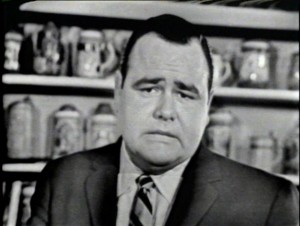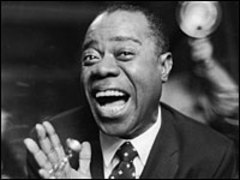A friend writes:
I watched your last two embedded video clips together—Jonathan Winters and Louis Armstrong—and I was struck with the occasional unhappiness in both men’s faces. You could assemble a collage of momentary Armstrong stills that would look like rage, torture, you name it. Winters turned his unhappiness into comedy and blankness (the blankness was funny, of course, but I think it was also truly blank). Your man turned it into joy—much harder, much more worthy.
My friend is a veteran biographer, so I expect him to be shrewd about the niceties of personality, but even for him this was an acute observation. Winters, of course, was a man who could be fairly described as emotionally troubled, enough so that his once-great career more or less disintegrated, though he kept on working to the end of his life. And while Armstrong was a fundamentally sunny and optimistic person, his moodiness was sufficiently well known to his friends and colleagues that Time mentioned it in its 1949 cover story: “He has occasional fits of sullenness and sometimes falls into a temperamental rage.”
 In Winters’ case, his private sorrows were arguably characteristic of those drawn to his profession. It’s no secret that much comedy—maybe most of it—is driven by anger and aggression. When I reviewed Mad Cow Theatre’s 2013 revival of Neil Simon’s Laughter on the 23rd Floor, I was struck by the honesty with which Simon acknowledged that fact in what amounted to a roman à clef about the writers with whom he had worked in the Fifties on Sid Caesar’s Your Show of Shows:
In Winters’ case, his private sorrows were arguably characteristic of those drawn to his profession. It’s no secret that much comedy—maybe most of it—is driven by anger and aggression. When I reviewed Mad Cow Theatre’s 2013 revival of Neil Simon’s Laughter on the 23rd Floor, I was struck by the honesty with which Simon acknowledged that fact in what amounted to a roman à clef about the writers with whom he had worked in the Fifties on Sid Caesar’s Your Show of Shows:
The excellence of this revival lies in the kill-or-be-killed ferocity with which the actors tear into the script, taking their cue from this exchange between Val (Tim Williams), the head writer, and Kenny (David Almeida), the show’s resident egghead: “A little aggression is good for writers. All humor is based on hostility, am I right, Kenny?” “Absolutely. That’s why World War II was so funny. Schmuck.” Everybody in the cast, especially Mr. Williams, throws their punches savagely hard, knowing that the Jewish humor in which Max’s writers specialize is rooted in anger–and honesty.
Jazz is (often) a different story, and Louis Armstrong a very different sort of artist. When I portrayed him on stage in Satchmo at the Waldorf, I made a point of showing his capacity for rage, since it’s an aspect of his personality of which most of his fans were and are unaware. But I also allowed my fictionalized Armstrong to describe what I believe to be the truth about his character, in words that are largely his own:
I don’t think folks wanna hear all that angry shit when they lay down that good money to come hear me play. They ain’t paying for me to make ’em feel bad. I’m just an old ham actor—blow a tune, tell a joke. I’m there in the cause of happiness. Like when I play the blues, maybe I’m thinking about one of them low-down moments, like when your woman don’t treat you right. Hell of a thing when a woman tell you, “I got me another mule in my stall.” But when I sing about it, I smile. Make you smile….To me, jazz got to be a happy music. Even when it’s about the bad part of life, it’s happy down deep. Even when it’s about the bad part of life, it’s happy down deep—and that’s what makes it good.
 Yes, there are other ways to turn life into art, and there were those who thought that his sunny-sided aesthetic was naïve. But Armstrong was no naïf: he was a man without illusions who had seen the worst that life has to offer. His commitment to hope was serious, just as all first-rate comedy is serious, and as I’ve said many times in this space and elsewhere, I believe deeply that comedy, with its honest acknowledgment of the unintended absurdities of human existence, is at bottom truer to life than tragedy. That’s what makes it good—and that’s what made Louis Armstrong great.
Yes, there are other ways to turn life into art, and there were those who thought that his sunny-sided aesthetic was naïve. But Armstrong was no naïf: he was a man without illusions who had seen the worst that life has to offer. His commitment to hope was serious, just as all first-rate comedy is serious, and as I’ve said many times in this space and elsewhere, I believe deeply that comedy, with its honest acknowledgment of the unintended absurdities of human existence, is at bottom truer to life than tragedy. That’s what makes it good—and that’s what made Louis Armstrong great.
UPDATE: I wrote this posting before learning of Robin Williams’ suicide—an eerily appropriate coincidence, and not merely because he had been influenced by Jonathan Winters and worked with him on Mork and Mindy. I can’t say that it came as a surprise to me. I always found his manic brand of comedy to be disquieting, enough so that I actually wondered early in his career whether he might possibly have suffered from some form of mental illness, though there was never any question of his great gifts.
Seeing Williams play a creepily pitiful bad guy in One Hour Photo left me in no doubt that he had real talent as a dramatic actor, in part because he had immediate access to the feelings of rage and self-loathing that so clearly drove his comedy. Would that he had turned to legitimate theater (he only appeared in two straight plays in New York, Mike Nichols’ 1988 revival of Waiting for Godot and Rajiv Joseph’s Bengal Tiger at the Baghdad Zoo) instead of settling for what Hollywood had to offer an aging comedian. Perhaps stage acting, especially in dead-serious comedies like Godot, might have given his anger a cathartic outlet. Instead, it consumed him.
* * *
Louis Armstrong and the All Stars play “Back o’ Town Blues” on the BBC in 1965:


